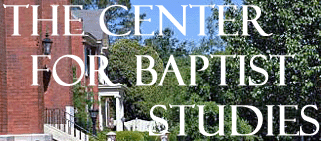|
Liberty of conscience used to be something that
every Baptist held dear.
John Smyth, the historical founder of the Baptist
movement, took exception to the church enforcing creeds. He believed
that, "Christ only is the king, and lawgiver of the church and
conscience." Thomas Helwys, founder of England's the first Baptist
church also published England's first treatise calling for universal
"freedom of conscience." Roger Williams, founder of both the first
Baptist church in America and the Colony of Rhode Island, secured
the first charter in the world that established "free, full, and
absolute liberty of conscience." Virginia Baptists, "fearing that
the liberty of conscience, dearer to us than property or life, was
not sufficiently secured," refused to ratify the U.S. Constitution
until the first amendment was added to guarantee that church and
state would be separated. Those early Baptists were opposed to
anything that "emboldens people to judge the liberty of other men's
consciences." Sentiment against creeds was still so strong in 1845
that the Baptists who founded the Southern Baptist Convention
refused to write a statement of beliefs. They would follow "no
creed, but the Bible."
To allay fears about the danger of creedalism, when
in 1925 the SBC adopted the first Baptist Faith & Message (BF&M)
statement, its non-binding character was made clear by the assertion
that it has "no authority over conscience." Later, in the 1963
revision, an explicit statement was added declaring that BF&M
statements were not "official creeds carrying mandatory authority."
Herschel Hobbs, chair of the 1963 BF&M committee, predicted that,
"In all likelihood the only thing that would divide Southern
Baptists with regard to their faith would be for one group -- to the
right or left of center or even in the center -- to attempt to force
upon others a creedal faith."
Confessions vs. Conscience
As they enter the twenty-first century, Southern
Baptists have reversed their stand against creeds.
The revisers of the 2000 BF&M deleted the 1963
statement denying that the BF&M carries "mandatory authority" and
replaced it with the assertion that BF&M's are "instruments of
doctrinal accountability." (See Preambles) That statement alone
would have been enough to convince our Baptist forefathers that
people were being emboldened, "to judge the liberty of other men's
consciences."
History has vindicated the Baptists who warned that
"confessions of faith" could become creeds that would undermine the
inviolability of every believer's conscience and lead to divisions.
In 1791 John Leland wrote,
"Why this Virgin Mary between the souls of men and
the Scriptures? Had a system of religion been essential to salvation
or even the happiness of the saints, would not Jesus, who was
faithful in all his house, have left us one? If he has, it is
accessible to all. If he has not, why should a man be called a
heretick because he cannot believe what he cannot believe, though he
believes the Bible with all his heart? Confessions of faith often
check any farther pursuit after truth, confine the mind into a
particular way of reasoning, and give rise to frequent separations."
Christ can no longer be the only "king and lawgiver
of the church and conscience," when "instruments of doctrinal
accountability" are made to mediate like the "Virgin Mary between
the souls of men and the Scriptures."
Church Competency vs. Soul Competency
Historically, Baptists have insisted that every
believer is competent to interpret the scriptures according to the
dictates of a conscience that is guided by the Holy Spirit. Under
the traditional understanding of "soul competency," each soul is
directly accountable to God for his/her beliefs and actions.
The 2000 BF&M redefines "soul competency." It makes
every soul accountable to the church for his/her beliefs and
actions. Southern Baptists are now "accountable to each other under
the word of God." (Preamble, 2000 BF&M) Rather than reading and
interpreting scripture for themselves, twenty-first century Southern
Baptists will be holding each other accountable for adhering to the
official interpretations of scripture that have been codified in the
2000 BF&M.
The Bible vs. Jesus
The most unconscionable change in the 2000 BF&M is
its promotion of the Bible at the expense of Jesus.
The preamble to the 1963 BF&M declared that,
"Baptists are a people who profess a living faith. This faith is
rooted and grounded in Jesus Christ who is 'the same yesterday, and
today and forever.' Therefore, the sole authority for faith and
practice among Baptists is Jesus Christ whose will is revealed in
the Holy Scriptures. A living faith must experience a growing
understanding of truth and must be continually interpreted and
related to the needs of each new generation."
In 1963, "living faith" was understood to be a
dynamic, personal relationship with Jesus. Here truth is ultimately
personal. Jesus is, "the way, the truth, and the life."
The preamble to the 2000 BF&M deletes that statement
entirely and replaces it with a declaration that, "Our living faith
is established upon eternal truths."
In 2000, "living faith" is understood to be mental
assent to the logic of a doctrinal expression of "the truth as
revealed in scripture." Here truth is ultimately rational. It is a
property of words and sentences in the Bible.
The priority of faith in the Bible over faith in
Jesus is made more explicit in the 2000 BF&M's article on scripture.
In 1963, the Bible was described as "the record of" God's
self-revelation. God was understood to have supremely revealed
himself by incarnation in Jesus. The Lordship of Christ over the
process by which every believer interprets scripture was
acknowledged by the affirmation that, "The criterion by which the
Bible is to be interpreted is Jesus Christ."
In 2000, the description of the Bible as a "record"
of God's revelation has been deleted. The affirmation that Christ is
the "criterion" by which the Bible is to be interpreted has also
been removed. Jesus has been demoted and the Bible has been
promoted. Now the Bible is understood to be the supreme revelation
of God and Christ is merely "the focus of divine revelation." The
Lordship of Christ over the process by which believers interpret the
Bible for themselves has been replaced by a process in which
believers adhere to the interpretations provided for them by the
2000 BF&M.
Hierarchy vs. Autonomy
Historically Baptists have stood in the free church
tradition. We have understood churches to be autonomous and free
from ecclesiastical control. Decisions about who the congregation
called as pastor and/or ordained as deacons was determined by how
the congregation felt led by the Holy Spirit.
The 2000 BF&M decrees that "the office of pastor is
limited to men" and ignores the biblical examples of God calling
women to lead men in worship and service (Ex. 15:20; Judges 4; 2
Kings 22:14, Micah 6:4; Joel 2:28-29; Luke 2:26-28; Acts 2:16-21;
Acts 18; Acts 21:9; 1 Cor. 11:5; Rom. 16:1,7).
There can be no doubt that the 2000 BF&M has been
designed to authorize the hierarchical exercise of ecclesiastical
control over those churches that feel led by the Holy Spirit to call
women as their pastors. Other violations of local church autonomy
are sure to follow.
Husbands vs. Wives
Finally, the 2000 BF&M advises only wives that they
must "graciously submit" to their husbands and neglects to tell
husbands that they must submit with as much or more grace than their
wives.
The BF&M's interpretation of Eph. 5:22 ignores the
grammatical (in the Greek) and logical priority that must be given
to the command to mutual submission in (Eph. 5:21). It makes the
husband "lord" of the wife rather than acknowledging that Christ is
Lord over both. Adding to these errors is the view that the metaphor
"head" (Eph. 5:23) should be seen as an image of a proud and
powerful "military ruler" rather than as an image of a
self-sacrificing and humble "suffering servant" who voluntarily sets
aside power and glory and gives his life for his family (Phil.
2:3-8).
These issues make acceptance of the 2000 BF&M
unconscionable for Mainstream Baptists. |

